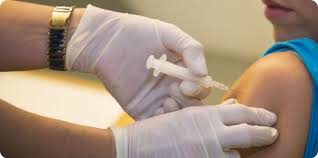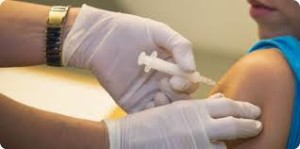The government has rejected a petition pleading for the meningitis B vaccine to be given to all children, not just babies.
Thousands of people from Brighton and Hove were among more than 800,000 nationwide to have signed the petition.
Petitions with more than 100,000 signatures are debated in Parliament. The meningitis B petition is reported to be the most popular petition on the Parliament website.
It said: “All children are at risk from this terrible infection yet the government plan to only vaccinate two to five-month-olds.
“There needs to be a rollout programme to vaccinate all children, at least up to age 11.
“Meningococcal infections can be very serious, causing meningitis, septicaemia and death.”
The Department for Health responded by saying that the vaccine “is offered to infants, free on the NHS, at two months with further doses at four and 12 months”.
It said: “The programme, as advised by independent experts, offers protection to those at highest risk.”
It added that Britain was the first –and to date the only – country to introduce a national, publicly funded immunisation programme for infants using the Bexsero vaccine.
The department said: “We are leading the world in offering children protection from this devastating disease.
“National immunisation programmes are introduced on the advice of the Joint Committee on Vaccination and Immunisation (JCVI), the independent expert body that advises the Government on all immunisation matters.
“(The) JCVI reviewed all available evidence before it advised on eligibility for the Bexsero vaccine.
“It recommended that meningitis B immunisation should be routinely offered to the group of children at the highest risk – infants at two months of age with a further dose at four months and a booster at 12 months, provided that the vaccine could be procured at a cost-effective price.
“There is a duty on the Secretary of State for Health to ensure, so far as is reasonably practicable, that the recommendations of the JCVI are implemented.”
The programme started on (Tuesday) 1 September last year, the department said, for two-month-olds – babies born on or after (Wednesday) 1 July.
It added: “A one-off catch-up programme was recommended by (the) JCVI for infants born from (Friday) 1 May 2015 to (Tuesday) 30 June 2015.
“This ensured that those infants were offered the vaccine before the winter peak of the disease.
“By May 2017, all children under the age of two years will have been offered the vaccine.
“The vaccine is also available for a small number of older children and adults who are at increased risk of infection, such as those with no spleen.
“The NHS budget is a finite resource. It is therefore essential that (the) JCVI’s recommendations are underpinned by evidence of cost-effectiveness.
“Offering the vaccine outside of (the) JCVI’s advice would not be cost effective and would not therefore represent a good use of NHS resources which should be used to benefit the health and care of the most people possible.
“When any new immunisation programme is introduced there has to be a cut-off date to determine eligibility.
“While this is extremely difficult for parents whose children aren’t eligible there is no other way of establishing new programmes to target those at highest risk without introducing inequalities.
“This approach is supported by the best evidence and by independent recommendations. (The) JCVI considered older age groups (one to four-year-olds) but did not advise a catch-up programme in view of the marginal cost-effectiveness of even the infant programme.”
The department also said that not all strains of the group B meningococcal bacteria were covered by the vaccine and cases could still occur in vaccinated infants and children.
It added: “There are also other strains of meningococcal disease for which there is currently no vaccine.
“It therefore remains important for parents to be alert to the symptoms of meningococcal disease such as fever, blotchy skin, refusal to feed, irritability, cold hands and feet, rash, muscle pain, and a stiff body with jerky movements or else floppy and lifeless.
“They should trust their instincts and seek urgent medical attention if they have concerns.”








